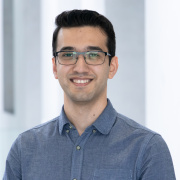
Dr. Naeim Ghavidelnia
Postdoctoral Researcher
Cluster of Excellence livMatS @ FIT – Freiburg Center for Interactive Materials and Bioinspired Technologies
Phone: +49 761 203 95323
Email: naeim.ghavidelnia@livmats.uni-freiburg.de
Post Doc Project
I aim to advance programmable mechanical metamaterials for adaptive shape morphing in energy-autonomous material systems. By categorizing existing unit cell designs and validating them through simulations and experiments, I will develop an AI-driven design process to optimize shape-morphing capabilities. The goal is to create a toolbox that accelerates the design of complex, functional metamaterials for applications like soft robotics and precision motion control.
Supervisor
PhD Project
Self-sealing by orchestrating chemical and mechanical mechanisms and processes as basis for self healing in livMatS
In a living materials system, the essential requisite for initiating the self-healing process is that the two parts of a crack or cut come into close contact without external factors. This prerequisite is called the self-sealing capability of the material. Mechanical metamaterials can be programmed to adapt automatically to changing conditions such as alteration in stress and strain state. In my research, I investigate programmable mechanical metamaterials to design and develop the appropriate unit cells with mechanical crack closure and self-sealing ability.
Project Outcome
In my cumulative dissertation, I systematically investigated self-sealing mechanisms in biological and engineered materials, introducing a structured approach to transfer plant-inspired self-sealing strategies into programmable mechanical metamaterials. This includes the development of a pressure-dependent metamaterial inspired by Delosperma cooperi, utilizing chiral unit cells and curved permeable walls to generate a localized squeezing effect for global shape morphing required for crack closure (Ghavidelnia et al., 2024, Advanced Materials). To facilitate the transfer of biological self-sealing mechanisms into engineering, a novel methodology using flowcharts and control flows was proposed, enabling a systematic deconstruction of complex biological processes into actionable design principles (Cao and Ghavidelnia et al., 2023, Programmable Materials). Additionally, a new design of bistable and monostable curly beams in metamaterials was introduced, optimizing their structural characteristics for energy storage and controlled deformation (Ghavidelnia et al., 2023, Materials & Design).
First supervisor
Publications in livMatS
- Bio-Inspired Pressure-Dependent Programmable Mechanical Metamaterial with Self-Sealing Ability*
Ghavidelnia, N., Slesarenko, V., Speck, O., Eberl, C. (2024). Bio-Inspired Pressure-Dependent Programmable Mechanical Metamaterial with Self-Sealing Ability. Advanced Materials, 2313125. doi: 10.1002/adma.202313125 - Addressing manufacturing defects in architected materials via anisotropy: minimal viable case*
Joedicke, I., Ghavidelnia, N., Felsch, G., Slesarenko, V. (2024): Addressing manufacturing defects in architected materials via anisotropy: minimal viable case. Acta Mechanica. doi: 10.1007/s00707-024-03855-9 - Flow charts as a method to transfer self-sealing from plant models into programmable materials and related challenges*
Cao, B., Ghavidelnia, N., Speck, O., & Eberl, C. (2023). Flow charts as a method to transfer self-sealing from plant models into programmable materials and related challenges. Programmable Materials, 1, e12. doi: 10.1017/pma.2023.11 - Controlling auxeticity in curved-beam metamaterials via a deep generative model
Felsch, G., Ghavidelnia, N., Schwarz, D., & Slesarenko, V. (2023). Controlling auxeticity in curved-beam metamaterials via a deep generative model. Computer Methods in Applied Mechanics and Engineering, 410, 116032. doi: 10.1016/j.cma.2023.116032 - Curly beam with programmable bistability
Ghavidelnia, N., Yin, K., Cao, B., & Eberl, C. (2023). Curly beam with programmable bistability. Materials & Design, 230, 111988. doi: 10.1016/j.matdes.2023.111988.